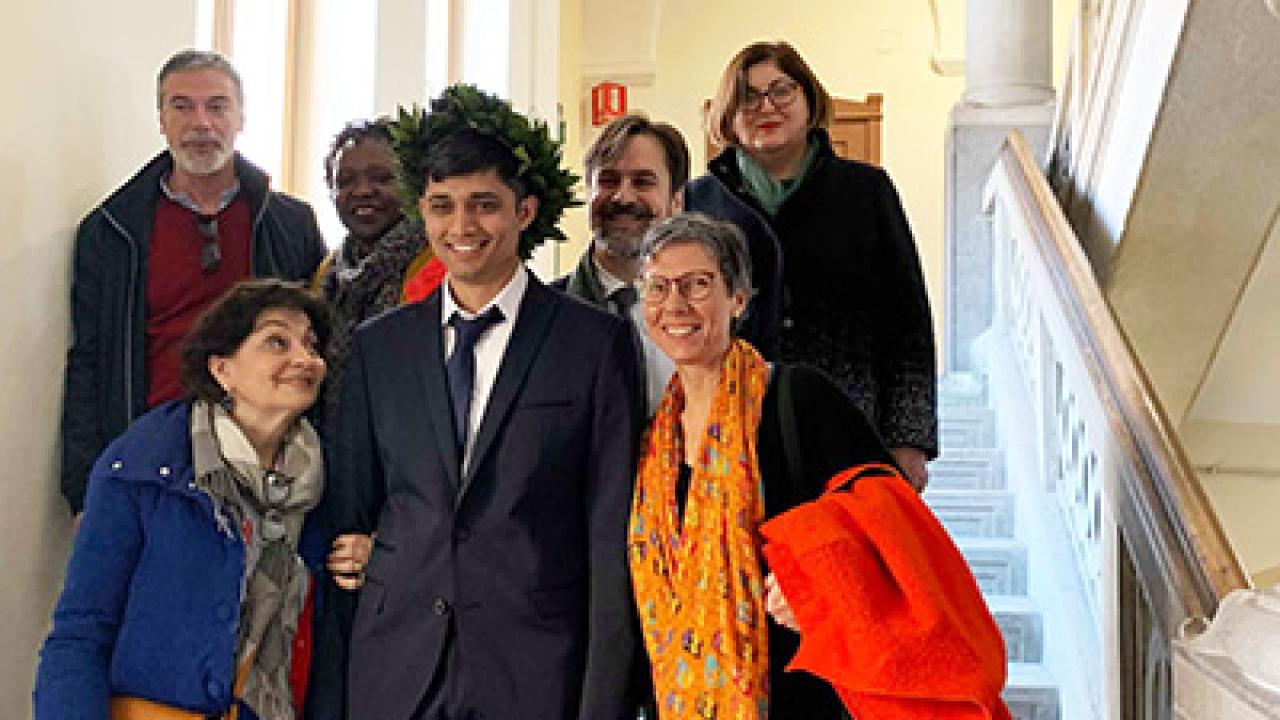
Graduating from university is a significant milestone for any young student. It represents the culmination of years of hard work, dedication, and encroaching deadlines. Yet the college experience varies for everyone, and not all students enjoy a choice of where they can study. Students from less advantaged parts of the world face additional challenges, from poor facilities to lack of study options or, in the case of 26-year-old Pakistani refugee Sadiq Khan, threats to personal safety. Indeed Khan, who works in ICTP's Marie Curie Library, was forced to cross continents before he could safely continue his education. In the three years since his arrival in Italy, his perseverance and determination have culminated in his recent graduation from a master's programme at the University of Trieste. It is an achievement for which he gives large credit to the support of ICTP.
Holding to family tradition, Khan began his academic career in civil engineering. “My cousins and my other brothers are civil engineers, so I did the same,” he said. He joined his brothers to work at a construction site, but Khan’s interests soon turned to the humanities. He decided to pursue a second bachelor’s degree, in international relations, at the University of Peshawar.
Technically, studying for two bachelor’s degrees was not allowed. Yet Khan was determined to keep both majors and found a clever way to circumvent the system. Because university registration records were kept in paper copy, the lack of a collective data network meant Khan could enroll in the two branches simultaneously. For four years he balanced morning engineering courses while international relations classes filled his afternoons. During lunch he would bike between the two campuses, though the biggest challenges, he said, were the overlapping exam schedules. His resourcefulness paid off, and Khan earned two degrees.
After graduation, Khan found work with the UN World Food Programme and the UN High Commissioner for Refugees, both in Afghanistan. In the meantime, the political situation in the region deteriorated. He soon began to receive personal threats from the Taliban. Unwilling to put his and his family’s lives at risk, Khan fled Pakistan in 2015 at the age of twenty-two. He sought refuge in northeastern Italy, and it was here where he would encounter ICTP.
Around the same time Khan arrived in Italy, ICTP researcher Matteo Marsili was searching for ways to help refugees with science backgrounds. He and Daniela Humar, a psychologist who worked with refugees, created an internship that would allow those like Khan to continue in their respective professions. Humar recommended Khan to Marsili due to his professionalism and prior experience with the U.N. “Many of these people, because of war, have to leave their track of science”, said Marsili, “and what we can do is help put them back on this track.” In addition to Khan, the internship brought six others to ICTP. Khan became an assistant in ICTP’s Marie Curie Library, a place he now considers his second home and whose staff have become a second family to him.
Now part of a supportive community, Khan was eager to continue working towards his professional and educational goals. With a recommendation from ICTP Director Fernando Quevedo, he was accepted into the University of Trieste’s International Relations graduate programme. Khan wanted to continue traveling during his studies, and decided to participate in an Erasmus exchange programme in Kraków. Upon his return five months later, he resumed his duties in the Marie Curie library.
Khan’s Library colleagues attended his graduation from the University of Trieste this spring. “On graduation day I was asked, ‘is there family you want to get a picture with?’” he reflected. “All of them were there and I said, this is my family.” The feeling is reciprocal. Librarian Valerio Cappellini describes how Khan has become a cherished member of the library family. “He’s not the type of person who asks for many things,” said Cappellini, “but if you give him something, he'll make it flourish.”
And flourish he has. Over the past three years, Khan has integrated into Italy both personally and professionally, and now helps others do the same. His knowledge in both science and humanities gives him the unique ability to connect with people across a variety of disciplines. After studying in both Trieste and Kraków, Khan has formed a large network of international friendships.
In addition to his work at ICTP, he supports other refugees using his Italian language skills to help them navigate the health and education systems. “For migrants it’s really difficult to understand the Italian education system, how to get in,” he said, referencing electronic course registrations and piles of complicated paperwork. Khan also accompanies refugees to hospitals if they cannot describe their illnesses to doctors. Important and rewarding though it may be, he admits translation work can become monotonous. Luckily, Khan is a patient person.
Due to circumstances beyond his control, Khan lacked choices many students take for granted. Just two years ago he could not afford a fifty-cent coffee. Now, he has put down roots in Trieste and with a little help and lots of determination, is steadily following his own path. Khan has a special interest in working with migration policy and is currently searching for PhD programmes in Europe. His master’s degree is not only a great academic achievement, but a reminder of his ability to face any challenge which comes his way.
--Maria Leuzinger
















